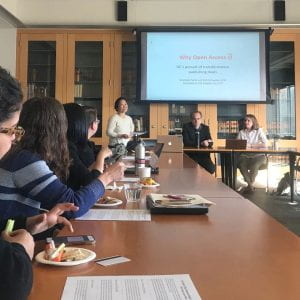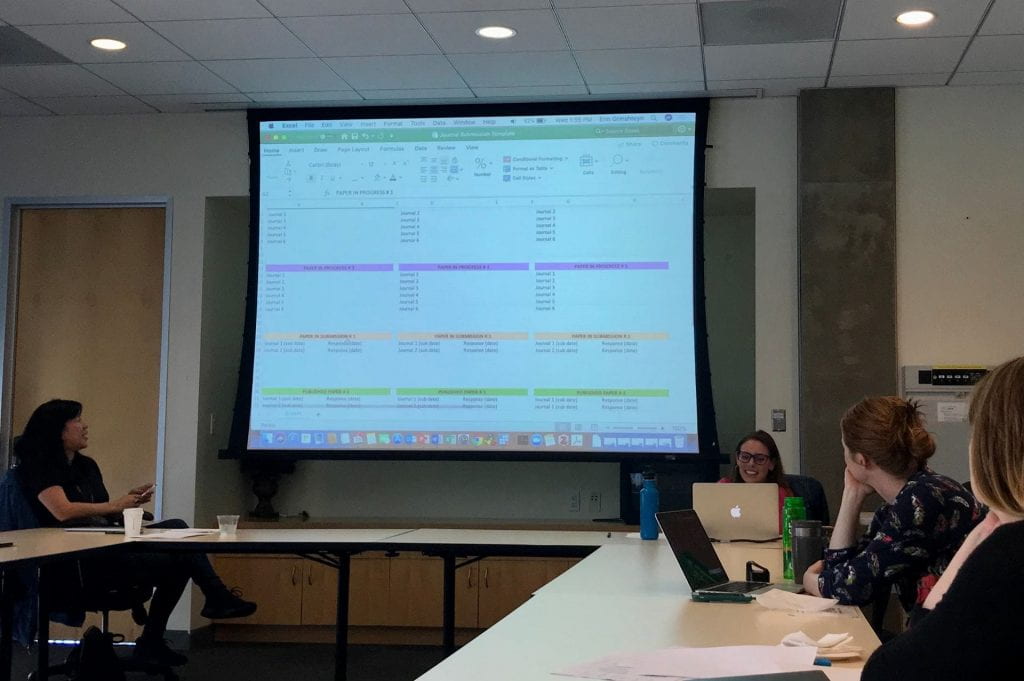Defending Free Speech in Academic Publishing through Copyright and Fair Use
In this blog, scholarly communication librarian Charlotte Roh addresses copyright in publishing contracts for a better understanding of how fair use operates to extend free speech to criticize, comment, and report as one normally would in the course of academic writing.

Photo by LeAnn Meyer of The University of Kansas Libraries
For academics who are new to negotiating book contracts, one of the boilerplate items that you’ll find in the contract, and quite frequently the author guidelines, is a request from the publisher to make sure that you have the right to use other people’s (copyrighted) material in your work when you submit your manuscript. This often includes asking for permission from other authors and sometimes paying the copyright holder.
However, in many instances, asking for permission isn’t necessary. You already have the right to use copyrighted work in your scholarship – it’s built into copyright law itself, which exists, “To promote the progress of science and useful arts, by securing for limited times to authors and inventors the exclusive right to their respective writings and discoveries.”[1]
 This is from the preamble, and note which clause came first in the mind of our founding fathers – to promote the progress of science and useful arts in our new country. Kyle Courtney, the Copyright Advisor for Harvard University, notes that copyright law, and the fair use doctrine in particular, works together with the first amendment that “Congress shall make no law abridging the freedom of speech or freedom or press” as a supplement to the Constitution, “to prevent our new government from becoming a tyranny…connected with the fundamental belief that open and informed discussion of current events promotes stability and the general security of the nation.”
This is from the preamble, and note which clause came first in the mind of our founding fathers – to promote the progress of science and useful arts in our new country. Kyle Courtney, the Copyright Advisor for Harvard University, notes that copyright law, and the fair use doctrine in particular, works together with the first amendment that “Congress shall make no law abridging the freedom of speech or freedom or press” as a supplement to the Constitution, “to prevent our new government from becoming a tyranny…connected with the fundamental belief that open and informed discussion of current events promotes stability and the general security of the nation.”
I think we can all agree that the ability to report, comment, analyze, and teach is important, and depends on free speech. But it also depends on copyright law, because otherwise we would not be able to use the work of others while doing those very things. For example, Teen Vogue can screen capture and use tweets in order to report on the racism in the movie Ghost In the Shell, and I can screen capture that article from Teen Vogue in order to use it to make that educational point right here.[3]
Where is this ability to use other people’s works written in the law? Why don’t the reporters have to ask permission, or pay someone, as publishers sometimes ask authors to do? Well, it’s written into copyright law itself, and it’s called the fair use doctrine. Title 17, Section 107 of this law states:
“Notwithstanding the provisions of sections 106 and 106A, the fair use of a copyrighted work, including such use by reproduction in copies or phonorecords or by any other means specified by that section, for purposes such as criticism, comment, news reporting, teaching (including multiple copies for classroom use), scholarship, or research, is not an infringement of copyright.”
This is the very same law that allows you to use works in the classroom. But hold up! Why are publishers then insistent on getting permissions for work, and why are you told not to make copies of textbooks for classes?
One reason is to mitigate legal risk – nobody wants to get sued, and many publishers operate out of an abundance of caution. But several publishers, such as UC Press, MIT Press, and Duke University Press, actually support fair use. It does behoove you to meet the standards, however, in which case you should go through the four factors of fair use. I often refer people to this handy checklist put out by Columbia University: https://copyright.columbia.edu/basics/fair-use/fair-use-checklist.html
To many people, this seems like too much work. It seems easier to ask permission than to have to rationalize what is fair use or not. But proponents of fair use will point to the music industry’s sampling market as an example of “use it or lose it.” Sampling from other musicians, musical quotation if you will, used to be free. But as profit and litigation grew, the market for sampling increased, triggering the fourth factor of fair use, that the use would not cause market harm.
What does this have to do with academics? What proponents of fair use do not want to see happen is something similar in the academic market, where you would have to license and pay for every quotation and excerpt.[4] In fact, scholars, lawyers, and librarians now celebrate Fair Use Week in order to raise awareness so that we don’t lose the right to challenge, criticize, correct, parody, and speak out. I think this is particularly important in this era of alternative facts and fake news, when so much of the research that we depend on seems to be in jeopardy.[5] So use your fair use rights! They’re important to academic freedom of speech.
About the Author:
Charlotte Roh is the Scholarly Communications Librarian at the University of San Francisco Gleeson Library and has over a decade of experience in academic publishing and libraries at the University of Massachusetts, Oxford University Press, and Taylor and Francis. Her most recent publication, “Agents of Diversity and Social Justice: Librarians and Scholarly Communication” won the 2017 LPC Award for Outstanding Scholarship in Library Publishing.
If you’d like to learn more or have any questions about copyright, fair use, or academic publishing, please contact Charlotte Roh at the Gleeson Library croh2(at)usfca.edu. See also the CRASE blog on Negotiating Book Contracts.
[1] Copyright Act of 1976, 17 U.S.C. §§ Preamble (2012)
[2] Courtney, Kyle. “Fair Use Fights Fascism: Some Fair Use Week Thoughts on the 1st Amendment & Fair Use” (February 2017) https://vimeo.com/204835410
[3] Elizabeth, De. “Ghost in the Shell’s Early Review Point Out Whitewashing” (March 2017) Teen Vogue. http://www.teenvogue.com/story/ghost-in-the-shell-early-reviews-whitewashing?mbid=social_twitter
[4] Particularly if you don’t have to! Federal publications are free to the public, and some things might be out of copyright, but unscrupulous bodies will still charge for them. Here’s a recent example, from a photographer who donated her work to the public but found that the Getty was charging for her photos: https://arstechnica.com/tech-policy/2016/07/photographer-sues-getty-images-for-selling-photos-she-donated-to-public/
[5] Schlanger, Zoë. “Rogue Scientists Race to Save Climate Data from Trump” WIRED (January 2017) https://www.wired.com/2017/01/rogue-scientists-race-save-climate-data-trump/
![INSIDE CRASE [Backup Jan 2021]](http://usfblogs.usfca.edu/crase/files/2018/02/crase_logo-1nupzm8.png)



Leave a Reply